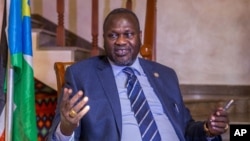South Sudan rebel leader Riek Machar has assured the U.N. secretary-general by phone that he is ready to return to Juba in March to take up his position as first vice president.
In an interview with VOA, Machar said he was waiting for the first phase of the security arrangement, as agreed to in a peace accord, to be implemented before he returned.
Secretary-General Ban Ki-moon wanted to ascertain when Machar would be in Juba to be sworn in, expediting formation of the transitional unity government that is aimed at restoring peace in the world’s newest nation.
Machar said Ban promised support for the full implementation of the accord he signed with President Salva Kiir. His comments came after the U.N. chief met with Kiir on Thursday.
Machar said the agreement lacked resources for its implementation, a concern he said he mentioned in recent meetings with African heads of state.
Waiting for troop airlift
“I have told him that I am ready to go to Juba, particularly at this time when the JMEC [Joint Monitoring and Evaluation Commission] has confirmed and assured me that Juba is being demilitarized and that our forces of 1,370 shall be transported to Juba," Machar said. "So I am waiting for when the airlift will start. Once the airlift is finished, I will definitely be following them."
Machar said Ban also told him that as soon as the government was formed, he would help call a donor conference and acquire funds for implementation of the security agreement.
"There are many aspects of this agreement that need international support, such as the assembling and containment of troops, which would mean provision of shelter, food, water and a health service to the troops," he said.
Machar said he had yet to speak to Kiir about the peace accord they signed. He said that when he returns to Juba, he is likely — after consultations with colleagues, stakeholders and other South Sudanese — to confer with Kiir on implementation of the agreement.
He also said there is need for a joint deployment of police to Bor, Malakal, Juba and other parts of the country to end the violence in those areas. Once peace is restored, other aspects of the agreement can be implemented, Machar said.
Number of states
“Once I get to Juba, once we form the government, then we should start discussing," he said. "I hope by then President Salva would have suspended the 28 states."
The deal that South Sudan’s warring parties signed in August called for the new government and a division of powers between the government and the opposition. Implementation stalled when Kiir changed the political landscape by establishing 28 states. The peace agreement was based on an understanding of 10 states.
“The major activity," Machar said, "is assuring the people of South Sudan that peace has come, which would mean political stability, and security is maintained. And now we can address issues such as the IDPs [internally displaced persons], which are in [U.N.] protection centers."
Machar was previously vice president of South Sudan from independence in 2011 until July 2013, when Kiir fired him and the rest of the Cabinet. The political rift erupted into violence that December and has never entirely stopped.
The conflict has displaced more than 2 million in an already poor and underdeveloped country.
Both sides are accused of having committed grave human rights violations during the conflict.




